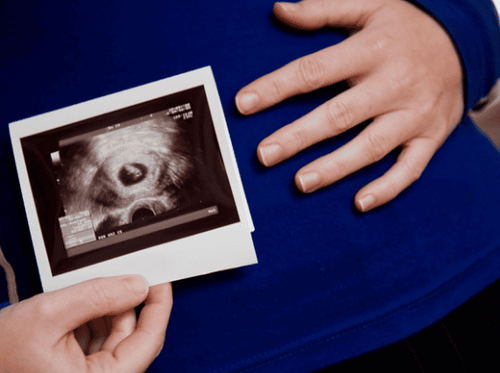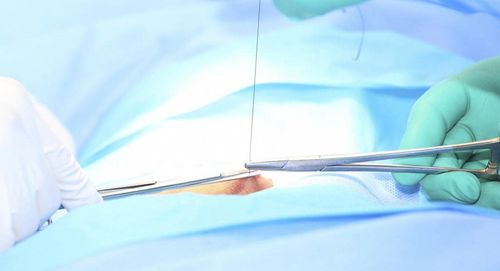This is an automatically translated article.
The article was professionally consulted by MSc, Dr. Trinh Thi Thanh Huyen - Obstetrician and Gynecologist - Department of Obstetrics and Gynecology - Vinmec Hai Phong International General HospitalOne of the causes of early miscarriage is an empty egg. This is a phenomenon where the fertilized egg does not develop and there is no embryo. At this time, there is only a gestational sac in the uterus, and the embryo will not be able to attach and develop.
1. What is an empty egg pregnancy?
Empty egg phenomenon (empty egg): occurs when a fertilized egg is implanted in the uterine wall but cannot develop into an embryo. It is one of the leading causes of pregnancy failure or early miscarriage. This condition usually occurs around 8-13 weeks of pregnancy, sometimes so early that many women do not even know they are pregnant.
Usually after 5-6 weeks of pregnancy, the fertilized egg will have an embryo and a gestational sac (where the fetus develops) about 18mm wide. In the case of an empty ovum, the gestational sac still forms and develops, but there is no embryo. This is why empty eggs are also considered a form of miscarriage.
Although the embryo does not exist, the placenta still produces the pregnancy hormone hCG. Therefore, a blood test or pregnancy test will still give a positive pregnancy result. Women will also experience normal pregnancy symptoms.
Trắc nghiệm: Bạn có hiểu đúng về dấu hiệu mang thai sớm?
Các dấu hiệu mang thai sớm không phải chỉ mỗi trễ kinh mà còn có rất nhiều dấu hiệu khác như xuất huyết âm đạo, ngực căng tức,… Điểm xem bạn biết được bao nhiêu dấu hiệu mang thai sớm thông qua bài trắc nghiệm này nhé!
2. Expression of empty eggs
First, even though there is no embryo, a pregnant woman with an empty egg may still experience signs of pregnancy, for example:
Positive pregnancy test result Menstrual delay Nausea Chest pain. After that, the process of miscarriage begins with common symptoms such as:
Abdominal cramps and pain Vaginal bleeding No more pain, breast tenderness. This type of miscarriage often happens very early, and many cases do not even know they are pregnant. Moreover, due to the absence of an embryo, a miscarriage is also very easy to miss because it presents like a normal menstrual cycle, sometimes heavier and with a slightly increased menstrual blood volume. But not all bleeding in the first 3 months of pregnancy is a sign of miscarriage. The above empty egg signs also cannot accurately determine the absence of an embryo. Therefore, women should see a doctor as soon as they notice any unusual signs. A definitive diagnosis requires an ultrasound scan showing an empty uterus or an empty gestational sac.

3. Causes of empty eggs
Currently, medicine is still difficult to conclude what is the direct cause of an ovulatory pregnancy. However, it is possible to list a number of factors related to stopping pregnancy or causing consecutive ovulatory pregnancies:
Disorders of chromosome number 9 General structural problems carrying genes Poor quality sperm or eggs Amount affects embryonic development Abnormal cell division Autoimmune diseases, such as lupus or Antiphospholipid syndrome Infections Chronic diseases Environmental factors. If you experience consecutive ovulatory voiding, the patient needs to perform chromosomal analyzes of the embryo to find the exact cause.
4. Diagnosis and treatment of ova
4.1. Diagnose
In pregnancies where the egg is empty and there is no embryo, the pregnancy hormone hCG is still elevated as usual. This is because the placenta that produces this hormone after a fertilized egg can develop for a short time, even if the egg does not have an embryo.
In the first weeks of pregnancy, when ultrasound will show a gestational sac from 19 - 36 mm but no embryo. If the embryo continues to not be found at 8-13 weeks, it can be concluded that it is abnormal and just an empty gestational sac.
4.2. Treatment
After being diagnosed with an empty egg pregnancy, a doctor can suggest a number of treatment options to discuss with the patient. These include:
Waiting for a spontaneous miscarriage Using medication to promote a miscarriage, eg misoprostol (Cytotec) Performing a dilation and curettage (D&C) procedure to remove placental tissue from the uterus. Most D&C procedures are not indicated if you are in the first weeks of pregnancy. At this time, the body is able to remove the tissue on its own without medical intervention. However, the D&C procedure is beneficial if the patient wants to examine the tissues to determine the cause of the miscarriage.
The decision on treatment options will be based on the duration of pregnancy, medical history and emotional state of the pregnant woman. Patients should also clearly discuss with their doctor the side effects and risks associated with treatment options, as well as any questions they may have.
5. Some notes
Most ovum and embryoless pregnancies will have no way of preventing it. But the good news is that most women who have had an ovum are able to continue to get pregnant. Usually this happens only once, but you still run the risk of having successive ovulatory pregnancies. If you have had this problem multiple times, consider a number of different tests to evaluate, including:
Prenatal Genetic Screening (PGS) Semen analysis for sperm quality analysis follicle-stimulating hormone (FSH) levels Anti-mullerian hormone (AMH) test to improve egg quality. In addition, there is research that suggests that environmental exposure to many chemicals and toxic substances is also linked to egg vacancy and miscarriage.
After stopping a pregnancy, doctors often recommend that patients wait about 3 menstrual cycles to get ready for the next pregnancy before trying to conceive again. During this time, women should try to build a healthy lifestyle that helps the body recover quickly both physically and mentally by:
Adhering to a nutritious diet; Keep a good mood, control stress; Exercise - sports; Supplementing with folic acid helps prevent birth defects in the fetus. All in all, knowing important information about what an ovulatory pregnancy is will help prepare a woman for a healthy future pregnancy. Before becoming pregnant, both husband and wife should have a general examination, gynecological examination as well as necessary tests and vaccinations.
Vinmec International General Hospital is one of the hospitals that not only ensures professional quality with a team of leading medical doctors, modern equipment and technology, but also stands out for its examination and consultation services. comprehensive and professional medical consultation and treatment; civilized, polite, safe and sterile medical examination and treatment space.
Please dial HOTLINE for more information or register for an appointment HERE. Download MyVinmec app to make appointments faster and to manage your bookings easily.













